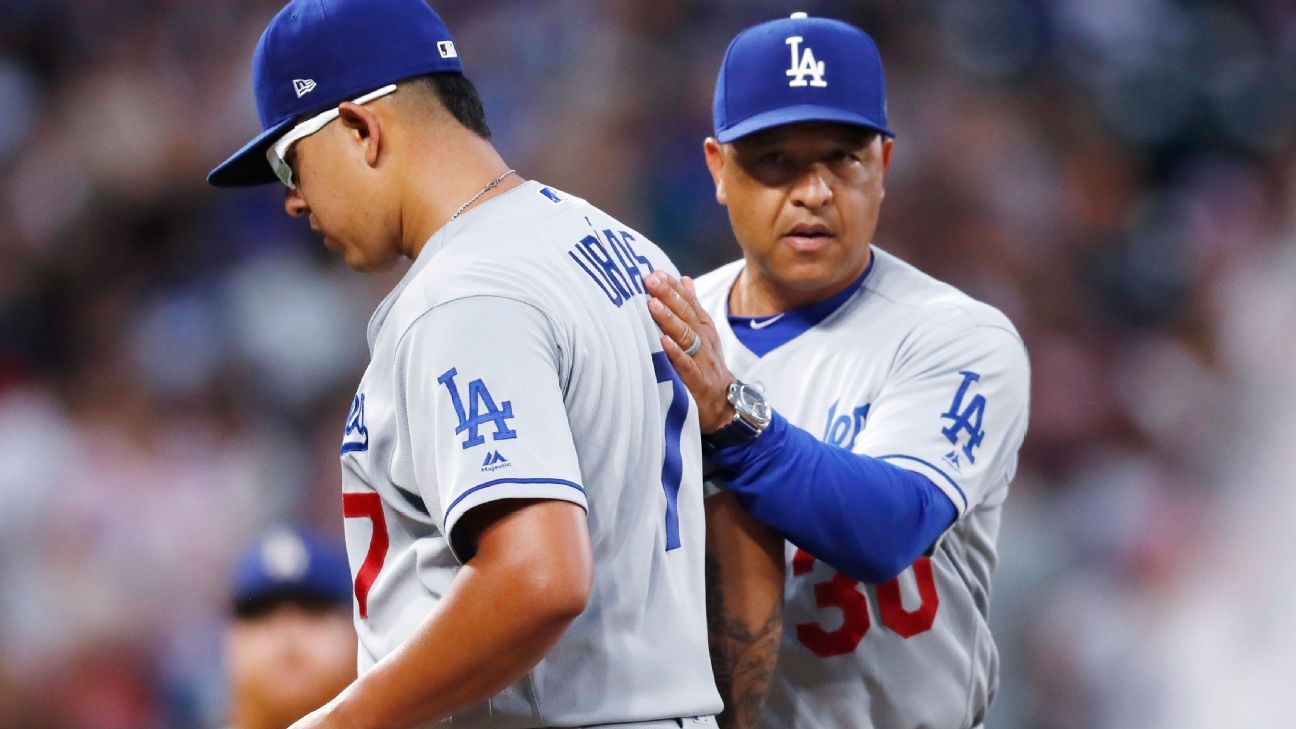LOS ANGELES — If the Los Angeles Dodgers, owners of baseball’s best record, don’t win this year’s World Series, the focus — fair or not — will probably shift back to July 31, 2019, the day the team’s front office failed to secure the high-end reliever it so desperately needed and coveted.
Andrew Friedman, the Dodgers’ president of baseball operations, sounded like a man at peace with that possibility.
“Everybody knows how hard we worked at it,” Friedman said, “how much we wanted for it to happen.”
The Dodgers pursued the likes of Felipe Vazquez and Brad Hand and Will Smith and Edwin Diaz, but came away with none of them. Instead, they made the type of depth-conscious additions previously relegated to the August waiver period, before Major League Baseball imposed a hard deadline for the 2019 season.
They added Jedd Gyorko, a right-handed-hitting infielder who can provide insurance for David Freese, Chris Taylor and Enrique Hernandez, all of whom, like Gyorko, currently reside on the injured list. And they added Adam Kolarek, a sidearm left-handed reliever who has allowed only five runs over his past 17 innings, but in no way represents the dominant late-inning bullpen arm many expected.
The Dodgers had a very specific need heading into the deadline, which limited their chances of securing it. And the asking price for that need was high, as evidenced by the fact that none of the aforementioned relievers switched teams. Friedman stressed that he was aggressive in his pursuit, maintaining negotiations with multiple clubs leading up to Wednesday’s 4 p.m. ET deadline. He also countered what has become a stereotype for young, analytically driven front offices — that they are too obsessed with winning trades to make them.
“I don’t think this is something where we were looking to win a deal from a value standpoint,” Friedman said on a conference call. “You kind of expect in July not to do that. We made plenty of offers that were definitely under water from a value standpoint but felt good about making because of the pieces that we have.
“But things have a funny way of playing out. A year or two from now, that could end up having been a really good thing. We’re not sure. But as far as process and the conversations and how aggressive we were, we felt really good about what we could control.”
In four prior seasons, Friedman has acquired Manny Machado, Yu Darvish, Rich Hill, Josh Reddick, Alex Wood and Tony Watson for late-season pushes. This year, however, he was unwilling to meet the high demands for the high-end relievers he sought, ultimately keeping top prospects such as Gavin Lux, Dustin May and Keibert Ruiz.
The Dodgers reportedly had conversations with the Detroit Tigers about breakout closer Shane Greene; but Greene instead went to the Atlanta Braves, who were able to acquire three late-inning relievers to bolster a team that ended July with a 6½-game lead in the National League East. The Houston Astros, who defeated the Dodgers in the 2017 World Series, made the biggest move of all, acquiring Zack Greinke for a rotation that already includes Justin Verlander and Gerrit Cole; the deal gave the Astros a clear advantage over the New York Yankees, who, like the Dodgers, did nothing of relative substance at the deadline.
“Our focus in each deadline I’ve been here has been to be aggressive, and more often than not, that has resulted in an aggressive move,” Friedman said. “Today, it did not. But we had various conversations going up ’til 1 o’clock and feel like we’ve got a team, and depth in place, to win a championship.”
The Dodgers, cruising toward their seventh consecutive division title, have won 71 of their first 110 games this season. Their offense leads the National League in OPS, their starting rotation leads the NL in ERA and their defense leads the majors in defensive runs saved. But their bullpen — 4.06 ERA, 1.21 WHIP, 2.86 strikeout-to-walk ratio — lags behind. It hasn’t necessarily been bad, but it has clearly lacked a dominant late-inning reliever who could bridge the gap to closer Kenley Jansen.
Maybe it’ll be Joe Kelly, who holds a 5.20 ERA in the first season of a three-year, $25 million contract.
Maybe it’ll be Kolarek, who has held opposing left-handed hitters to a .302 slugging percentage throughout his career.
Maybe it’ll be Kenta Maeda, who has pitched in high-leverage situations over the past two postseasons. Or Julio Urias, the young left-hander who has excelled in a multi-inning role. Or May, who will be called up for his major league debut on Friday.
The Dodgers must now make that determination internally.
“We’ve got two months and a lot of really talented arms — some in the big leagues, some in the minor leagues — and we’re gonna spend these two months doing everything we can to figure out that right combination,” Friedman said. “It certainly won’t be from a lack of talent. We’re going to throw some high-quality arms at it. We feel good about our collective ability to do that.”
